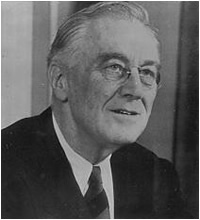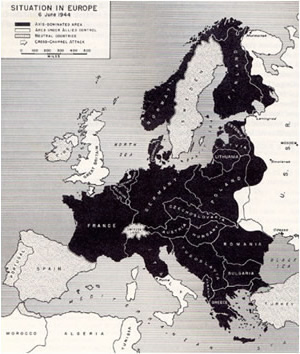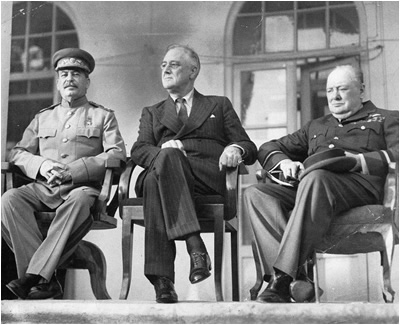|
The Weimer Republic was to pay
large amounts of compensation money to the victorious allied nations by the
Treaty of Versailles. During the unstable economical situation of the 1920s
and 1930s, Germany would not at all be possible to pay for the price of the
war.
The great stock market crash of
1929 caused high unemployment and inflation thoughtout the world. Adolf
Hitler's National Socialists party promised to rebuild Germany's economy and
to restore it's national pride. In 1933, Hitler was elected Chancellor of
the republic. One year later, after Reichs President Von Hindenburg had died,
he declared himself
Führer of the German people. Parliament granted him the power to
enforce
laws which were in violation with the constitution.
In the United States, around the
same time, the Democrat Franklin D. Roosevelt was elected president. His
New Deal of economical and social politics would rebuild the United
States' economy, and would guarantee social benefits for those unemployed.


As Hitler had established himself
Führer, he began to make
territorial demands in Europe, to provide living space for the Aryan race.
Both the allied nations and the League of Nations followed a policy of
appeasement to avoid war at any cost. Nazi Germany annexed Austria,
Sudetenland and Czechoslovakia, but it was not until the
invasion of Poland in
1939 that Great-Britain and France declared war on Germany.
During the depression, Europe had
witness the rise of two totalitarian dictatorships: Hitler in Nazi Germany
and Stalin in Soviet Russia. Once set on the courge of unlimited expansion
of their personal political powers, these giants of political will
inevitably looked to the rest of western Europe to expand their political
experiments, as Hitler annexed Austria, Sudetenland, Czechoslovakia and
Poland. The residue of liberal Europe (largely Britain and France) tried to
put up resistance, but they offered mostly just a bluff, as their policy of
appeasement failed.

In September of 1939, Nazi Germany
and Soviet Russia challenged that
bluff - quickly discovering how enfeebled France was and how indecisive
England was (until Churchill appeared on the scene after the war had started). Then
in 1941, with liberal Europe either out of the way or on the defensive,
Hitler and Stalin inevitably turned their ambitions on each other. When the
giants clashed the heavens shook.
When late in 1941
Hitler's ally in Asia, Japan, bombed the American naval station at Pearl
Harbor, America awoke like a sleeping giant. Until then, the United States
had been sitting out this widening European-Asian conflict, having been
burned by its brief participation in the earlier Great War. Now on the
counterattack, America's industrial system swung into full operation -
behind the protection of the great walls of the Atlantic and Pacific Oceans. While
the war demolished the industrial foundations of the two formerly greatest
industrial giants, Germany and Britain, it served in the United States only
to put incredible muscle into the American industrial economy. America came
out of the war not only on the winning side - but so far ahead of any other
country industrially and financially that it seemed literally to possess
fully half of the world's wealth within its own borders.
When World War Two
ended in 1945, Britain was physically devastated, France emotionally
devastated, and Germany almost non-existent. The rest of Europe had also
been dragged into the war and likewise was physically and emotionally wasted.

Russia had come
through the war crippled physically - but not emotionally. Hitler's attack
had pushed it into a strange alliance with the American-led liberal
democracies, that is, on the side that ultimately emerged as victors. In
fact at the war's end in 1945, Russian troops sat in occupation of the
entire eastern half of Europe - with Stalin still very much in control
throughout the whole region. Stalin's intentions were to rebuild the
destroyed industrial base of Russia with the industrial plunder of Eastern
Europe, and to hold the area as a buffer against any other intruders like
Hitler's Nazi Germany. At the same time troops
of the American-led western alliance were fully in control of life in the
western half of Europe.
|
![]()